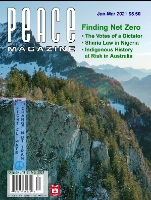
Peace Magazine Jan-Mar 2021, page 5. Some rights reserved.
The Covid-19 pandemic has taken its toll on every Canadian. Whether impacted emotionally, mentally, by illness or death, job challenges, or isolation, I don’t imagine anyone has been untouched in 2020.
However, no organization has needlessly been impacted as greatly as WE Charity. Early in the pandemic, they pivoted their community supports in the countries where they operate. In Kenya, they turned staff quarters into hospital beds in anticipation of an overflow of the Baraka Hospital facilities. They downsized their staff who would normally facilitate travel or be involved in the dozens of inspiring WE Day events across Canada, the U.S, and the UK. Clearly, they were buckling down to ride out the global pandemic.
I have been a supporter of the WE Charity since 2009. I founded and ran a local organization called “We Can Change the World Day” engaging local youth in volunteerism, leadership, and social action from 2013-2018. We raised over $65,000 for school classrooms in Kenya and India. During these years, I travelled to Kenya three times, and to India twice. These were trips that I paid for and that gave me an opportunity to visit the schools that we supported and meet the community members impacted by the work we were doing in Richmond Hill.
I brought back photos and stories, so that our youth and volunteers knew that their efforts were appreciated and the people we were supporting were real.
I imagine you have heard about the WE Charity Scandal. Actually, to me this was the WE Charity Tragedy, not only for the organization, but for the millions of youth who took inspiration from WE. Members of the Federal Conservatives demanded investigation into WE and all its activities, when WE agreed to support and operate the federal government’s Canada Student Service Grant initiative.
This service grant was intended to distribute funds that would support youth through volunteerism during the pandemic.
One aspect of the “scandal” was that Prime Minister Justin Trudeau and former Finance Minister Bill Morneau did not recuse themselves from the decision to engage WE in this initiative. The many other accusations that followed smeared WE’s reputation.
The bottom line is that WE Charity was exonerated on every count. Did you hear about that? Their exoneration came on October 30th, lost in the headlines of the U.S. election.
The scandal was none of WE’s doing in any way. That a 25-year-old organization with an extraordinary track record could have their reputation destroyed by a hashtag speaks tragically of bullying at the highest level.
Personally, I am deeply gutted by this. Supporters, like myself, have started to speak out, and I imagine we will continue to do so for months to come.
Perhaps a new hashtag needs to be created, although the question remains: How do you recover from a reputation that has been brutally attacked and badly tarnished by partisan politics?
Heather Skoll, Richmond Hill, ON
A common refrain prevails amongst Western capitalist nation governments and big business circles: Best business practices are best decided by business decision makers. Yet this was proven false by, as a most consequential example, Boeing’s decision to keep its ill-fated 737 Max planes flying, regardless of indicators, including employee warnings. They should be grounded and serious software glitches corrected.
While an ousted CEO received more than $62 million to leave Boeing—perhaps from what’s now described as a “culture of concealment”—346 ticket-buyers received a most horrific death.
Also, when the COVID-19 crisis began, the most influential, and maybe even the first, voices to have the ear of governments likely were the largest corporations, particularly the airlines. The result was resistance against an immediate halt in international commerce, including overseas flights. The weeks of delay may have translated into many COVID-19 deaths.
Frank Sterle Jr., White Rock, BC